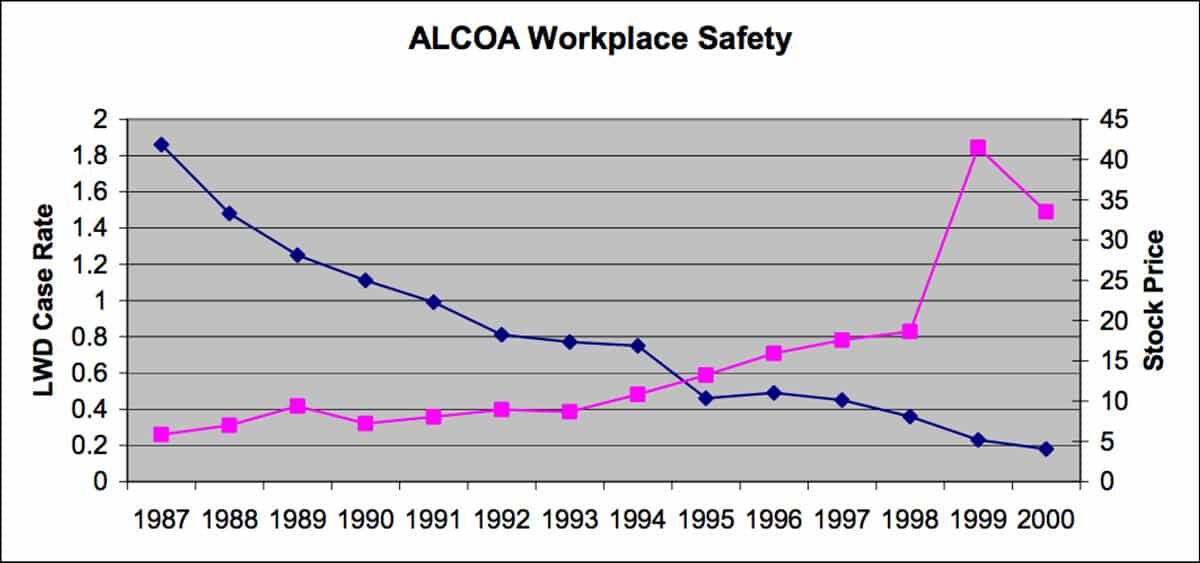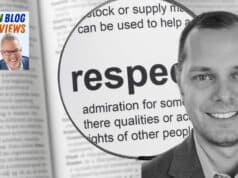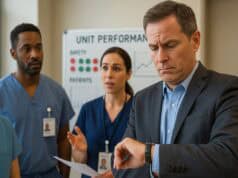Today, I went for a brisk 50-minute walk on a sunny morning and my companion was the voice of the late Paul O'Neill as I listened to the audio from a video I'm sharing here.
I listened to it and you can watch it here.
He was sharing reflections on Alcoa's journey, but it's a playbook for CEOs to follow.
Elements of this include the CEO:
- Making a commitment that nobody should get hurt at work (the same could be said about patients)
- State that you want to be the safest company in the world (and the best at everything that you do)
- Stopping the use of the word “accident” (which makes it sound inevitable or something God wanted) and use the word “incident” instead
- Realizing that only they can create the environment and the culture that allows people to do great improvement work and taking action toward that end
- Visiting sites and making this commitment to workers
- Saying that you won't make anybody budget for safety improvement — you'll find a way to pay for it
- Giving out your personal phone number and tell employees to CALL you if the safety commitment isn't being met by local managers
- When you get that first phone call, thanking the employee and follow up immediately with the plant manager (or hospital CEO)
- Note: word will spread that you are following up on your words — this will be a big benefit to your culture change efforts
- Setting goals at the “theoretical limit” (such as zero harm) but do not “bludgeon” people with that goal — use it as an inspirational and aspirational goal
- Encouraging root-cause problem solving instead of papering over problems
- Practicing extreme transparency with information across the organization, including reports about injuries that start with the worker's name (to humanize the situation and keep it from being just numbers)
- Publishing employee injury data publicly on the company website
- Learning to “ask questions like a third grader” and to keep asking “why?”
- Creating a more egalitarian culture (questioning why executives get perks like free coffee and danish that are not offered to factory workers)
- Focusing on safety is something that everybody can commit to — it's “unarguable.” You'll end up on the path to habitual excellence related to everything the business does.
“An organization is either habitually excellent… or it is not. There is no partial habitual excellence.”
Paul H. O'Neill, Sr. (1935 – 2020)
There's more to it, but those are the things that come to mind without having taken notes during the walk.
What other key points or quotes stand out to you? Leave a comment on the post.
Listening to Mr. O'Neill, I realize he's describing a system that's built on principles. If you don't share the principles (such as “nobody should ever get hurt at work”) then I wouldn't expect his method to work. If you try to copy just part of the system (setting a goal of zero), I also wouldn't expect this approach to work.
What would your hypothesis or expectation be if your organization got a new CEO who followed this approach?
Could a CEO who had been at an organization for a while change their spots and start following this approach?
My suspicion or assumption is that you'd have to be an outsider and new to the organization, as was Mr. O'Neill (technically he had been a board member of Alcoa, but coming in as CEO was his first job as a true insider).
What other reflections or thoughts come to mind from this video?
I admire the clarity of purpose that Mr. O'Neill had. I appreciate his approach and his true respect for every employee (going beyond their physical safety). He wasn't just about words… it was also about action and leadership.
And remember this chart that shows how safety improved along with the Alcoa stock price:

And safety continued to improve after his departure — a sign that this approach was not just due to one charismatic leader. Mr. O'Neill emphasizes that the organization and the people did this. He played an important role as leader (and he says the same thing about Dr. Rick Shannon who introduced him before this speech six years at UVa.
Here is my podcast with Dr. Shannon, also from 2011, about the time of this video:
Dr. Shannon was, of course, deeply influenced by Mr. O'Neill during their time in Pittsburgh.
Free eBook
A transcript of this speech, and others, can be found in this free eBook — A Playbook for Habitual Excellence.
Please scroll down (or click) to post a comment. Connect with me on LinkedIn.
Let’s work together to build a culture of continuous improvement and psychological safety. If you're a leader looking to create lasting change—not just projects—I help organizations:
- Engage people at all levels in sustainable improvement
- Shift from fear of mistakes to learning from them
- Apply Lean thinking in practical, people-centered ways
Interested in coaching or a keynote talk? Let’s start a conversation.










Two other articles worth reading:
Have We Learned The Alcoa ‘Keystone Habit’ Lesson?
How ‘Keystone Habits’ Transformed a Corporation
Loved it (Paul’s speech), thank you so much for sharing, Mark!